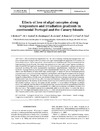Identificador persistente para citar o vincular este elemento:
https://accedacris.ulpgc.es/jspui/handle/10553/49568
| Título: | Effects of loss of algal canopies along temperature and irradiation gradients in continental Portugal and the Canary Islands | Autores/as: | Bertocci, I. Seabra, M. I. Dominguez, R. Jacinto, D. Ramírez Cañada,Rubén Coca, J. Tuya, F. |
Clasificación UNESCO: | 241705 Biología marina | Palabras clave: | Biological interactions Canopy-forming algae Disturbance Island ecology Large-scale experiments, et al. |
Fecha de publicación: | 2014 | Proyectos: | Respuesta de la Bota Intermareal A Perturbaciones Humanas: Efecto de la Eutrofización en El Marco Del Actual Contexto Climático. | Publicación seriada: | Marine Ecology - Progress Series | Resumen: | We examined the hypothesis that the loss of canopy-forming macroalgae from rock pools would have stronger effects on associated algal assemblages along gradients of harsher climate conditions (i.e. higher sea and air temperatures and irradiation) occurring in continental Portugal and the Canary Islands. The study was carried out at ‘cool’ and ‘warm’ regions in both systems (N and SW Portugal and Lanzarote and El Hierro Islands, respectively), using a comparative approach involving the same manipulative experiment simultaneously conducted at multiple locations. Canopy-forming macroalgae were experimentally removed, and the structure (abundance and distribution) of associated algal assemblages (in terms of morpho-functional groups) was compared between treated and unmanipulated plots 6 and 12 mo after removal of the canopy. In both continental Portugal and the Canary Islands, warmer conditions were associated with a larger Euclidian distance in the structure of assemblages between canopy-removed and unmanipulated plots 6 mo, but not 12 mo, after the removal treatment. Responses of morpho-functional algal groups varied depending on the system, in addition to the environmental gradient. Although the present findings could not be unequivocally ascribed to causal effects of climate conditions alone, they indicate that the effects of algal canopy loss were enhanced along gradients of harsher environmental conditions at even supposedly very different continental and island systems over the short term. The studied systems were potentially able to recover about 1 yr after the disturbance, but this might not happen under current or predicted scenarios of natural or anthropogenic disturbances able to drive a persistent loss of foundation species. | URI: | https://accedacris.ulpgc.es/handle/10553/49568 | ISSN: | 0171-8630 | DOI: | 10.3354/meps10785 | Fuente: | Marine Ecology Progress Series [ISSN 0171-8630], v. 506, p. 47-60 |
| Colección: | Artículos |
Citas SCOPUSTM
11
actualizado el 08-jun-2025
Citas de WEB OF SCIENCETM
Citations
11
actualizado el 01-mar-2026
Visitas
295
actualizado el 15-ene-2026
Descargas
182
actualizado el 15-ene-2026
Google ScholarTM
Verifica
Altmetric
Comparte
Exporta metadatos
Los elementos en ULPGC accedaCRIS están protegidos por derechos de autor con todos los derechos reservados, a menos que se indique lo contrario.
